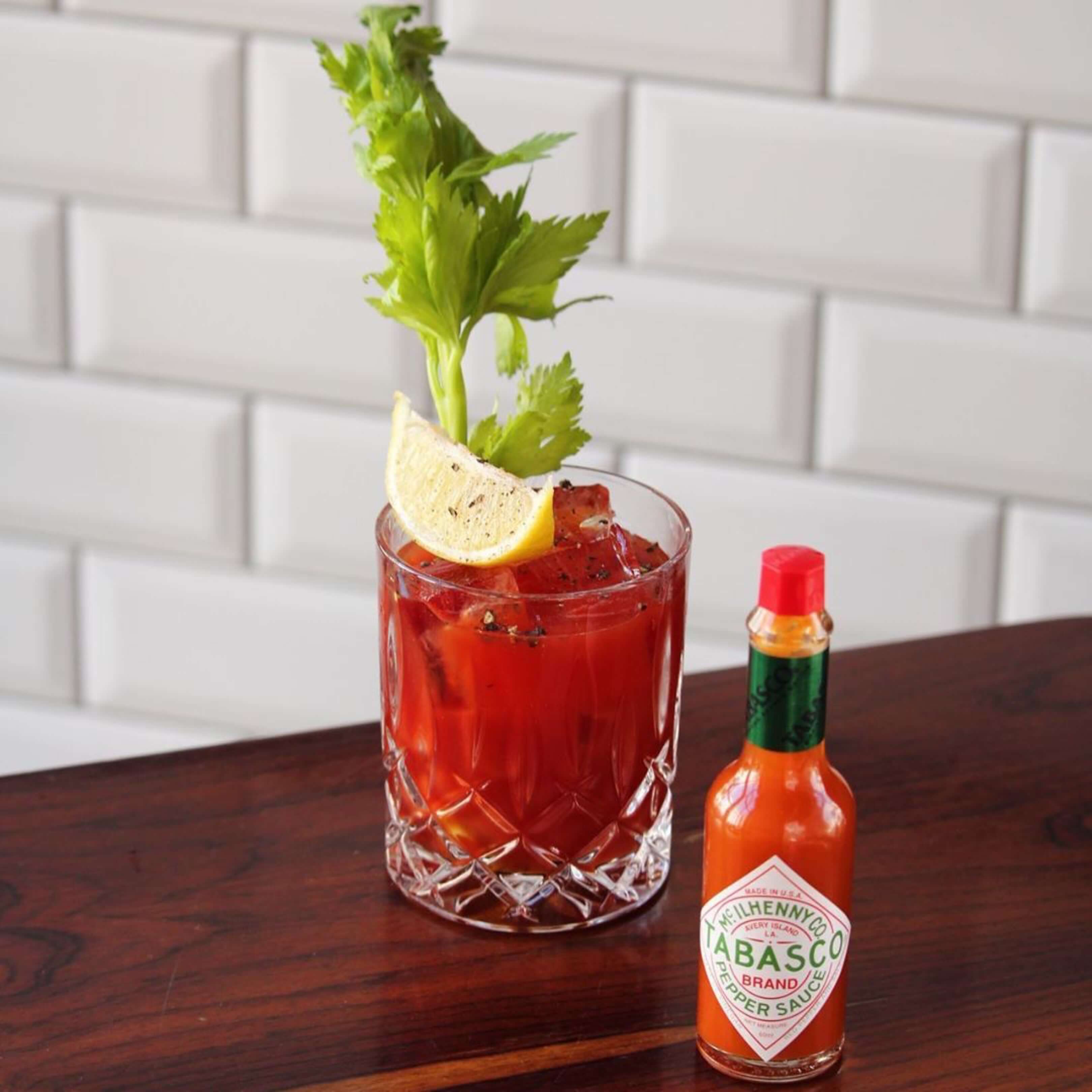Hangover cures are solid pillars in the folklore of drinking culture, self-styled remedies that aim to wipe the slate clean, pardon excess and rebuild a frayed psyche into a functioning whole. Hair of the dog. Raw eggs. Coffee, courage, ginseng and various recipes involving Tabasco sauce are just some of the popular fixes. But do any of them actually work to eradicate injury and restore health? We ask the experts for advice on that brutal opponent, the alcohol hangover.
A compendium of wine experts’ hangover cures
“I don’t have hangovers,” says Karen Gough with a poker face from behind the bar at Settlers Tavern, Margaret River, where she and husband Rob have honed, tested and perfected a wine list of 600-plus local and international wines over the past 17 years.
![]()
Karen Gough from Settler’s Tavern.
So, it is on the basis of collective wisdom, as opposed to personal experience, that Gough recommends the tavern’s Bloody Mary with grated fresh horseradish, salt on the rim, tall stalks of celery with the foliage intact, all garnished with a large green olive, as one of the best hangover remedies available. This vegan-friendly approach to curing a wild night is a full meal in itself, suitable for those seeking to maintain ethical standards even while pushing through the blurred prism of a post-excess world.
People may metabolise alcohol at different rates and some people’s bodies may respond to alcohol by mounting an inflammatory response through the release of chemicals called cytokines. Hormones may be involved; changes in a hormone called antidiuretic hormone can lead to increased urine output and dehydration; increased lactates and free fatty acids may make the blood more acidic also leading to dehydration.
Meanwhile, the folks at Maeve Wine in South Brisbane advocate for the curative powers of food and ultra-hydration when it comes to negotiating with a bullish hangover. The main goal, advises Maeve’s director Eleanor Cappa, is to “obtain a meal with as much fat and salt as one meal can contain” … and then add fluids.
“One of our chefs opts for cheesy corn quesadillas. Another says a fry up with eggs, bacon and hash browns is the only cure. One of the waiters swears by three different types of rehydration – she says you need a water, a Coke and a Powerade. I’m partial to a badly made ham and pineapple pizza – the perfect trifecta of salt, grease and sugar. Salty ham and thirst-quenchingly succulent sweet pineapple and a watered-down Coke over ice. Instant salvation.”
![]()
Coca-Cola is a common go-to hangover cure of the experts.
Salvation for Stuart Knox from Fix Wine in Sydney involves starting out gently and gradually ramping up efforts – with the unexpected determination of a classical music crescendo accelerating from soft to loud, as in Beethoven’s Fifth.
“For me, there’s a progression of cures applied as the morning progresses. I’ll start with a scaldingly hot peppermint tea, followed by a watermelon Gatorade (nothing else works!), followed swiftly by a lemonade icy pole. Once this has settled, a tweaked Bloody Mary, no vodka but extra Pedro Ximénez Sherry and a bowl of hot chips with lashings of chicken salt.”
Dark room, cold water, Netflix, toasties.
It’s an intensive regime carefully designed to circumvent trouble. Tony Harper of Craft Wine Store, amongst the seasoned professionals on this year’s Young Gun of Wine Awards tasting panel, offers some equally rigorous advice. “My best hangover cure: don’t drink. But you can’t do that, so honestly the best approach is to crack a beer as soon as you’re allowed and then slowly work yourself back into the day. I’m a back on the horse kind of guy.”
“Dark room, cold water, Netflix, toasties,” says Ian Trinkle, YGOW Awards co-panellist and group sommelier at Howard Smith Wharves, Brisbane, with total efficiency; all nouns, no verbs.
What does medical science tell us about hangovers?
“Nearly all people who have drunk alcohol have experienced hangover, that miserable feeling the day after or during the night after drinking that tells us, ‘Argh, I’ve drunk too much!’ with headache, tiredness, problems concentrating and thinking, poor memory, thirst, dizziness, nausea, weakness, stomach pain and mood changes,” says Dr Hester Wilson, a Sydney-based GP and addiction medicine specialist.
Drinks that contain higher levels of compounds called congeners, that contribute the colour and flavour to brandy, red wine, rum and whisky, can also impact on hangover severity.
These diverse symptoms combine to impart the unique sense of misery we experience during a hangover. And while the primary cause of hangover is clear, the precise physiological mechanisms underpinning it remain unknown.
“Hangover generally occurs as the blood alcohol level returns to zero and can last for 24 hours,” explains Dr Wilson.
“But bottom line, while we know that alcohol causes hangovers, we don’t yet really know how alcohol causes hangover. People may metabolise alcohol at different rates and some people’s bodies may respond to alcohol by mounting an inflammatory response through the release of chemicals called cytokines. Hormones may be involved; changes in a hormone called antidiuretic hormone can lead to increased urine output and dehydration; increased lactates and free fatty acids may make the blood more acidic also leading to dehydration.”
![]()
Whilst hair of the dog, and Bloody Marys, are a common go-to cure, Dr Wilson advises that the only way to prevent hangovers is to limit the amount you drink.
The other missing link when it comes to hangovers is a scientifically proven cure.
“While there are hundreds of anecdotal hangover cures out there, nothing has been shown to work,” says Dr Wilson. “The only way to prevent hangover is to drink less. You can of course do various things to relieve the symptoms, such as take paracetamol, rest, increase your fluids. But the only way to prevent hangovers is to limit the amount you drink. And if you are going to drink, drink slowly, eat food and drink water to slow your rate of alcohol intake and gut absorption.”
The severity of a hangover also varies from person to person. “Every individual will have their own propensity to have hangovers,” she explains.Age contributes, and women tend to have more severe hangovers compared to men. People with insomnia may suffer from worse hangovers, as well as those who mix alcohol with other psychoactive substances, such as tobacco or recreational drugs. Drinks that contain higher levels of compounds called congeners, that contribute the colour and flavour to brandy, red wine, rum and whisky, can also impact on hangover severity.
While most of us know first-hand the struggle of hangovers, a small cohort are genetically steeled against them.
“Up to 20 per cent of people claim to not experience hangovers. However, the majority of these are due to low levels of alcohol intake. There is nonetheless an interesting group of people who don’t seem to get hangovers. Their only complaint is fatigue, no matter how much they drink. It’s not known why they don’t get hangovers. Understanding the physiology of this group could point the way to understanding the complex body processes that lead to hangover,” Dr Wilson suggests.
![]()
Apparently we haven’t all been there. Dr Wilson says that there are a percentage of people that are immune to hangovers. (Image credit: The Hangover film, Warner Bros.)
The only reliable cure is time
Hair of the dog (that is, more alcohol) will only delay the inevitable. Even the most reliable of popular remedies will only ease some, not all of the symptoms. That leaves time as the best and most effective of cures for a hangover. Moderation is the way to prevent one altogether.
But faced with a looming debt from last night’s revelry, the first step is to fix dehydration by drinking water, then restore blood sugar levels by having something simple to eat or sweet to drink. An anti-nausea tablet or antacid can help appease an irritated stomach. Headache can be managed by rehydrating, replenishing blood sugar levels or taking paracetamol. Choose a different day to run a marathon. Rest if you can get it.
While there may never be a magic formula capable of obliterating all of a hangover’s ill-effects, one thing remains: a late-night slice of pizza after too many drinks will always be comforting (if not totally curative) as the next day makes its inevitable approach.









